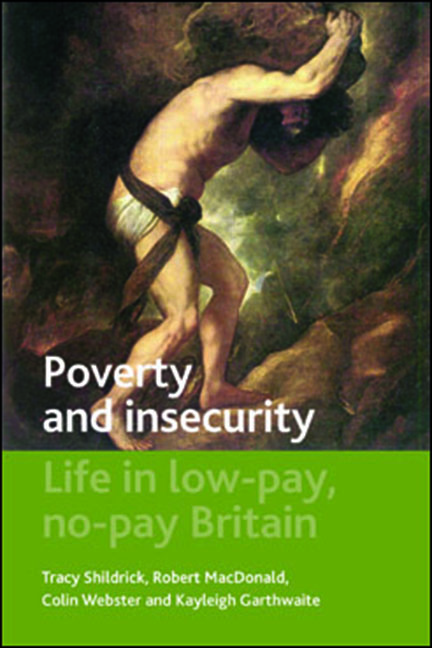Book contents
- Frontmatter
- Contents
- List of figures and boxes
- Acknowledgements
- 1 Introduction
- 2 Poor work, welfare and poverty
- 3 Researching the low-pay, no-pay cycle and recurrent poverty
- 4 The low-pay, no-pay cycle: the perspectives and practices of employers and ‘welfare to work’ agencies
- 5 The low-pay, no-pay cycle: its pattern and people's commitment to work
- 6 Searching for jobs: qualifications, support for the workless and the good and bad of informal social networks
- 7 Poor work: insecurity and churning in deindustrialised labour markets
- 8 ‘The ties that bind’: ill health and caring and their impact on the low-pay, no-pay cycle
- 9 Poverty and social insecurity
- 10 Conclusions
- References
- Index
9 - Poverty and social insecurity
Published online by Cambridge University Press: 07 September 2022
- Frontmatter
- Contents
- List of figures and boxes
- Acknowledgements
- 1 Introduction
- 2 Poor work, welfare and poverty
- 3 Researching the low-pay, no-pay cycle and recurrent poverty
- 4 The low-pay, no-pay cycle: the perspectives and practices of employers and ‘welfare to work’ agencies
- 5 The low-pay, no-pay cycle: its pattern and people's commitment to work
- 6 Searching for jobs: qualifications, support for the workless and the good and bad of informal social networks
- 7 Poor work: insecurity and churning in deindustrialised labour markets
- 8 ‘The ties that bind’: ill health and caring and their impact on the low-pay, no-pay cycle
- 9 Poverty and social insecurity
- 10 Conclusions
- References
- Index
Summary
In this chapter we turn to the interviewees’ experiences of poverty. A primary aim is to show how these experiences related to encounters with employment, with the welfare system and with debt. In other words, the chapter aims to examine the relationship between cycling between low-paid jobs, unemployment and poverty. While inadequate benefits and low pay were each important factors in explaining poverty, it was also the case that moving between these different states – between employment and unemployment – was in and of itself a key contributory factor to the informants’ financial hardship.
The first part of the chapter examines the way that research participants talked about poverty, focusing on the intriguing disjuncture between people's objective situations and their renouncement of ‘poverty’ as a description of these situations. Second, we describe the everyday hardship that was common across the sample. Third, we discuss the fact and experience of ‘in-work poverty’, how poverty continued even when people got jobs. Fourth, we explore encounters with the benefit system paying particular attention to the ways in which these fed into and exacerbated poverty. Here we report informants’ widespread antipathy to making benefit claims and the complexities and difficulties of doing so. Finally, the chapter examines the experiences of debt and how these were cumulative, difficult to escape and long lasting, overshadowing the lives of research participants, when they were in jobs and when they were out of them. In summary the chapter highlights how people lived in lasting, everyday hardship, because of their experiences of welfare and of low-paid jobs, and also because of their repeated movement between the two.
Talking about poverty: moral discourses of ‘the poor’
Our methodological approach was well placed to allow us to investigate subjective understandings of poverty from the perspective of those experiencing it. There is a lack of research evidence of this sort in the extant literature. As Lister notes, the voices and views of those experiencing poverty are rarely heard: ‘the poor’ are ‘frequently talked and theorised about but are rarely themselves in a position to have their thoughts published’ (2004, p 2). In discussing these issues in interviews we found that interviewees overwhelmingly rejected ‘poverty’ as a label that captured the condition of their own lives (people were much more willing to admit to ‘struggling to get by’, ‘to feeling the pinch’ or to ‘things being tight’).
- Type
- Chapter
- Information
- Poverty and InsecurityLife in Low-Pay, No-Pay Britain, pp. 167 - 192Publisher: Bristol University PressPrint publication year: 2012



